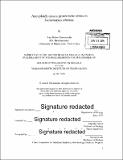Aneuploidy causes proteotoxic stress in Saccharomyces cerevisiae
Author(s)
Oromendia, Ana Belen
DownloadFull printable version (9.879Mb)
Other Contributors
Massachusetts Institute of Technology. Department of Biology.
Advisor
Angelika Amon.
Terms of use
Metadata
Show full item recordAbstract
Gains or losses of entire chromosomes lead to aneuploidy, a condition tolerated poorly in all eukaryotes analyzed to date. How aneuploidy affects organismal and cellular physiology is only beginning to be understood. Aneuploidy also has a profound impact on human health; it is the leading cause of mental retardation and spontaneous abortions and a key characteristic of cancer, as more than 90% of all solid human tumors have aneuploid genomes. Systematic analyses of aneuploid yeast and mouse cells suggested that aneuploidy causes chromosome-specific effects elicited by the amplification of specific genes and general aneuploidy-associated phenotypes Here I describe a phenotype that is shared by most if not all aneuploid yeast cells- I find that aneuploid budding yeast cells are under proteotoxic stress. I show that aneuploid strains are prone to aggregation of endogenous proteins as well as of ectopically expressed hard to fold proteins such as polyQ stretch-containing proteins. Prion conversion rates are also increased in most aneuploid yeast strains. Protein aggregate formation in aneuploid yeast strains is likely due to limiting protein quality control systems, since I present data showing that at least one chaperone family, Hsp90, is compromised in many aneuploid strains. The link between aneuploidy and the formation and persistence of protein aggregates has important implications for diseases such as cancer and neurodegeneration.
Description
Thesis: Ph. D., Massachusetts Institute of Technology, Department of Biology, 2014. Cataloged from PDF version of thesis. "June 2014." Includes bibliographical references.
Date issued
2014Department
Massachusetts Institute of Technology. Department of BiologyPublisher
Massachusetts Institute of Technology
Keywords
Biology.